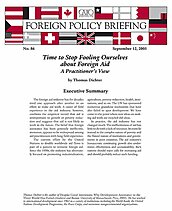The foreign aid industry has for decades tried one approach after another in an effort to make aid work. A career of field experience in the aid industry, however, confirms the empirical record that aid is unimportant to growth or poverty reduction and suggests that aid is not likely to work in the future. The belief that foreign assistance has been generally ineffective, moreover, appears to be widespread among aid practitioners with long field experience.
The current effort by the United Nations to double worldwide aid flows is part of a pattern to reinvent foreign aid. Since the 1950s, the industry has alternately focused on promoting industrialization, agriculture, poverty reduction, health, institutions, and so on. The UN has sponsored numerous grandiose resolutions that have also failed to spur development.
We have come to the point where new ideas on making aid work are recycled old ideas. In practice, the aid industry has not changed much. The ineffectiveness of aid has little to do with a lack of resources. Its roots lie instead in the complex nature of poverty and the flawed nature of institutions and governments in poor countries. The aid industry’s bureaucratic continuing growth also undermines effectiveness and accountability. Rich nations should reject calls for increasing aid and should probably reduce such funding.
About the Author

This work is licensed under a Creative Commons Attribution-NonCommercial-ShareAlike 4.0 International License.
